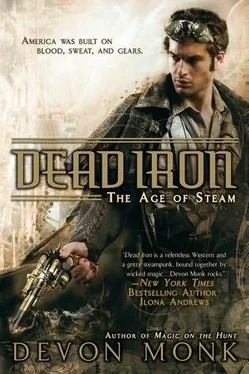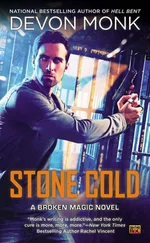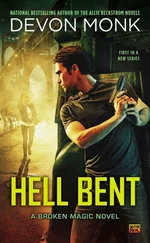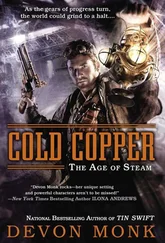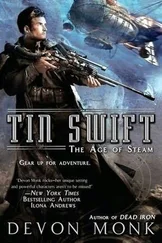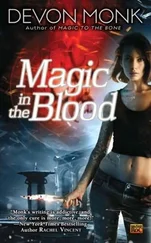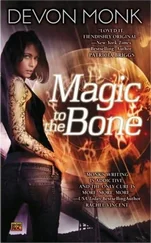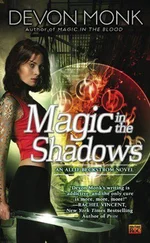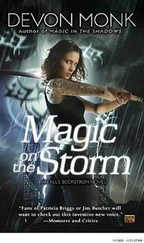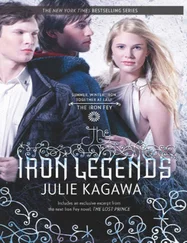Dead Iron
(The first book in the Age of Steam series)
A novel by Devon Monk
For my family
To my amazing agent, Miriam Kriss. Thank you for not telling me I was crazy when I first described this story to you and said I was going to write it. Your wisdom and advice made this book what it is. To my fabulous editor, Anne Sowards, who not only gave this book a chance, but also called and guided me through the trickiest turns with a steady hand. To the incredibly talented artist Cliff Nielsen, who brought Cedar Hunt to life with this gorgeous cover. And to the many people within Penguin who have gone above and beyond to make this book beautiful and strong. Thank you.
My deepest gratitude goes out to: Mom and Dad, for telling me your stories. Dean Woods, a virtuoso storyteller and brilliant brainstorming partner, for lending me your imagination. Dejsha Knight, for all your wonderful insight and help; Dianna Rodgers for reading this on the shortest deadline ever; and to my entire family and all my friends, who listened patiently while I whined and worried, yet still offered unflagging encouragement every step of the way. I couldn’t have done this without all of you. To my husband, Russ, and sons, Kameron and Konner, you are the best part of my life. Thank you for helping me make my dreams come true and for letting me be a part of your dreams. I love you.
Last, but certainly not least, I want to thank you, dear readers, for giving me the chance to spin this tale for you.
Cedar had stared straight into the killing eyes of rabid wolves, hungry bears, and charging bull elk, but Mrs. Horace Small had them all topped.
With dirt brown hair piled in a messy bun on the back of her head, and a pinch of anger between her brows, the storekeeper’s wife always seemed half a tick from blowing a spring.
“Two dollars,” she repeated, her fist stuck wrist-deep in the fabric at her hip, her jaw jutted out like a bass on a hook.
“Cornmeal, coffee, and a bit of cheese,” Cedar said mildly. He knew better than to let his anger show, especially this close to the full moon, in a store full of townsfolk eager to get their hands on the fresh supplies and gears from the old states. “Might be I’m missing something.” He looked back down at the receipt with Mrs. Small’s tight penmanship. “How again do they add to two dollars?”
He knew math—knew it very well. He’d spent four years back East in the universities and had plans of a teaching life. History and the gentle arts, not the wild metal and steam sciences of the devisers. He’d done his share of tinkering—had a knack for it—but did not have the restless drive of a true deviser, who couldn’t be left in a room with a bit of rope, metal, and a hammer without putting them all together into some kind of engine or contraption.
No, his needs had been simple: a teacher’s life filled with a wife and a daughter, and his brother, Wil. But that life had been emptied out and scraped clean six years ago, when he’d been only twenty-two. Leaving him a changed man.
Leaving him a cursed man.
“It’s written plain enough,” she said. “You do read, Mr. Hunt?”
“The part there that says ‘fee,’” Cedar asked without looking up. “What fee is that?”
“The rail takes its due. You aren’t part of the railroad, Mr. Hunt. Not a farmer, miner, rancher, or deviser. Not a member of this good community. I’ve never seen you in church. Not one single Sunday the last two years. That fee for the rail is less than all those months’ dues you owe to God.”
“Didn’t know the collection plate took hold to my provisions,” he said with a little more irritation than he’d intended, “and I don’t recall offering my wages to the rail.”
The mood in the general store shifted. The men in the shop—the three Madder brothers, dark-haired, dark-eyed, all of them short, bull-shouldered, and strong—were listening in. They’d stopped pawing and chuckling at the new metals and bits in the straw-padded crates, and were waiting. Waiting for him to say the wrong thing. Waiting for a fight.
Rose, Mrs. Small’s seventeen-year-old adopted daughter, stepped down off the stool where she’d been dusting. She darted behind Cedar and out the door, silent as a mouse fleeing danger. She had good instincts. He’d always admired that in her.
Mrs. Small lowered her voice and leaned over the counter between them. “You are a dirty drifter, Mr. Hunt. Any man out this far west with no plan of settling down isn’t drifting toward something—he’s trying too hard to drift away from something. The good folk of this town want you to be moving on. You’ve brought enough bad luck down on us. First the Haney stock got drug away by wolves. Then the little Gregor boy goes missing. Trouble like you needs to be moving on your way.”
“Trouble like me?” He tipped his hat down just a bit. “No offense, ma’am, but I took care of the wolf before the Haneys lost the rest of their stock. If I recall, there wasn’t another man out tracking it. And if I’d known about the Gregor boy wandering off, I would have been looking for him too. Animals aren’t the only thing I am capable of hunting.”
This time he did look up. Met her eyes. Watched the fire of her indignation go to ash. It never took much, no more than a glimpse of the thing that lived just beneath his civilized exterior, to end a conversation.
Days like this, he liked it. Liked what his gaze could do. But it was easy to lose his grip, to go from staring a person down to waking up with a dead body at his feet. He didn’t want that to happen. Not today.
Not ever again.
Cedar blinked, breaking eye contact with Mrs. Small. He pushed the bloody memories away and gave her a moment, because he knew she’d need one.
He took a moment too. He’d meant it when he said he’d look for the boy, would have been looking at the first sign of his getting lost. But Hallelujah wasn’t made of trusting folk. They’d seen too much hardship to think a man who kept to himself and came to town only rarely would go out of his way to do them any good.
Except for the dandy rail man, Mr. Shard LeFel. Rumor had it all the town held him in high esteem. Rumor had it, when he or his man Mr. Shunt walked by, folk fought a powerful need to bow down on their knees.
Cedar hadn’t yet met a man he’d be willing to bow to.
The Madder brothers swaggered up, caulk boots hollow on the shiplap floor. The brothers worked the silver mine. Breaking rock all day never seemed to satisfy their need to bust their way through a man’s bones every time they crawled out of the hills.
“How I see it,” Cedar said, hitching his words down low, quiet, “I’ve been some benefit to this town, me and my drifter ways. Hunted wolves, mountain lions, and nuisances for ranchers and working folk alike. I’ll be hunting for the lost boy. You can tell the Gregors that when they next stop in.”
He dug in his pocket and pulled out a silver dollar and enough copper to settle the bill. Fee included. He placed the coins on the counter, plus a penny extra, and plucked a jar of ink from the shelf.
Mrs. Small raised one eyebrow, but said no more.
The silver filigreed bird perched on the edge of the high window sang one sweet chirp. Its head was the size of a child’s thimble. The gears and burner inside it were so tiny, it chirped once every hour and needed only a half dropper of water a day to power it.
Valuable, that whimsy. He wondered where she had come by it. That delicate of a matic, a fine thing of little practical use, never survived this far west for long.
Beautiful things got crushed to dust out in these wilds.
Читать дальше
